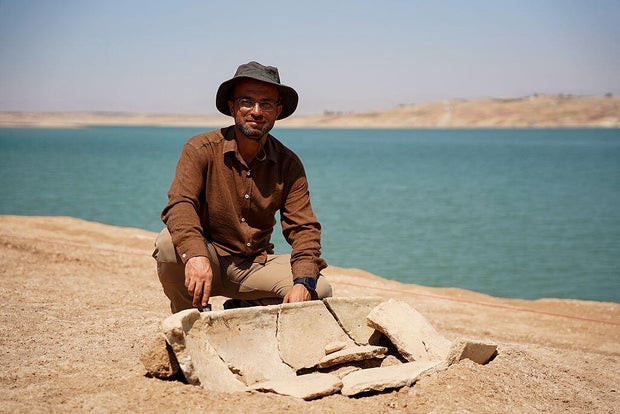Archaeologists in drought-hit Iraq have discovered 40 ancient tombs after water levels in the country’s largest reservoir declined, an antiquities official said Saturday.
The tombs, believed to be over 2,300 years old, were unearthed at the edges of the Mosul Dam reservoir in the Khanke region of Duhok province in the country’s north.
“So far, we have discovered approximately 40 tombs,” said Bekas Brefkany, the director of antiquities in Duhok, who is leading the archaeological work at the site.
ISMAEL ADNAN/AFP via Getty Images
His team surveyed the area in 2023 but only spotted parts of a few tombs.
They were only able to work on the site when water levels dropped “to their lowest” this year, Brefkany said.
In recent years, archaeologists have uncovered ruins dating back thousands of years in the same area, as a result of droughts that have plagued Iraq for five consecutive years.
“The droughts have significant impact on many aspects, like agriculture and electricity. But, for us archaeologists… it allows us to do excavation work,” Brefkany said.
The newly discovered tombs are believed to date back to the Hellenistic or Hellenistic-Seleucid period, according to Brefkany.
ISMAEL ADNAN/AFP via Getty Images
He added that his team is working to excavate the tombs to transfer them to the Duhok Museum for further study and preservation, before the area is submerged again.
Iraq, which is particularly vulnerable to the effects of climate change, has been facing rising temperatures, chronic water shortages and year-on-year droughts.
Authorities have warned that this year has been one of the driest since 1933 and that water reserves were down to only eight percent of their full capacity.
They also blame upstream dams built in neighbouring Iran and Turkey for dramatically lowering the flow of the once-mighty Tigris and Euphrates, which have irrigated Iraq for millennia.
Earlier this year, archaeologists in Egypt unveiled the millennia-old tombs of three senior statesmen, identified by inscriptions left on the tombs. The three sites in the city of Luxor date to the New Kingdom era, Egypt’s Ministry of Tourism and Antiquities said on social media, which ranged from about 1550 to 1070 B.C.

